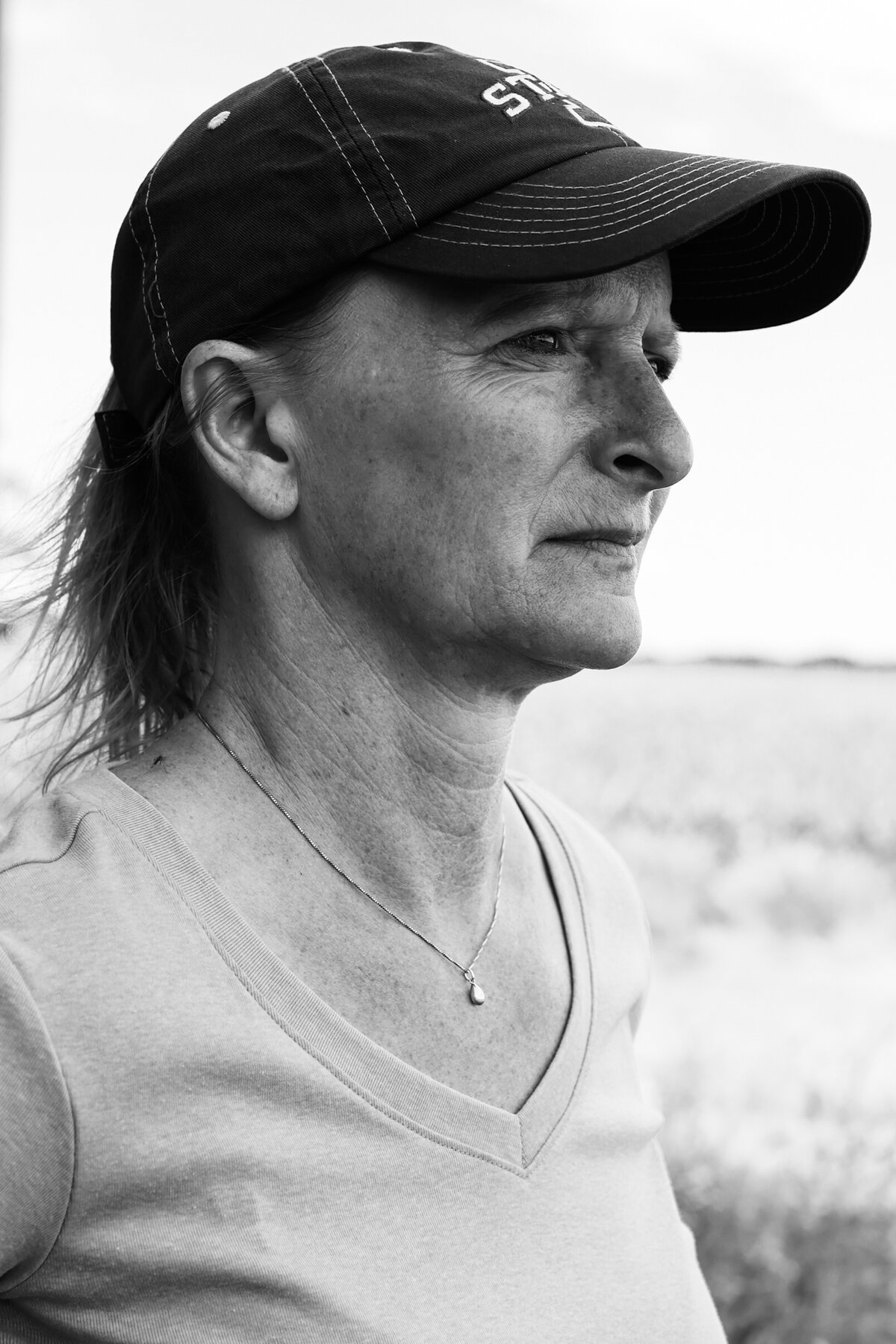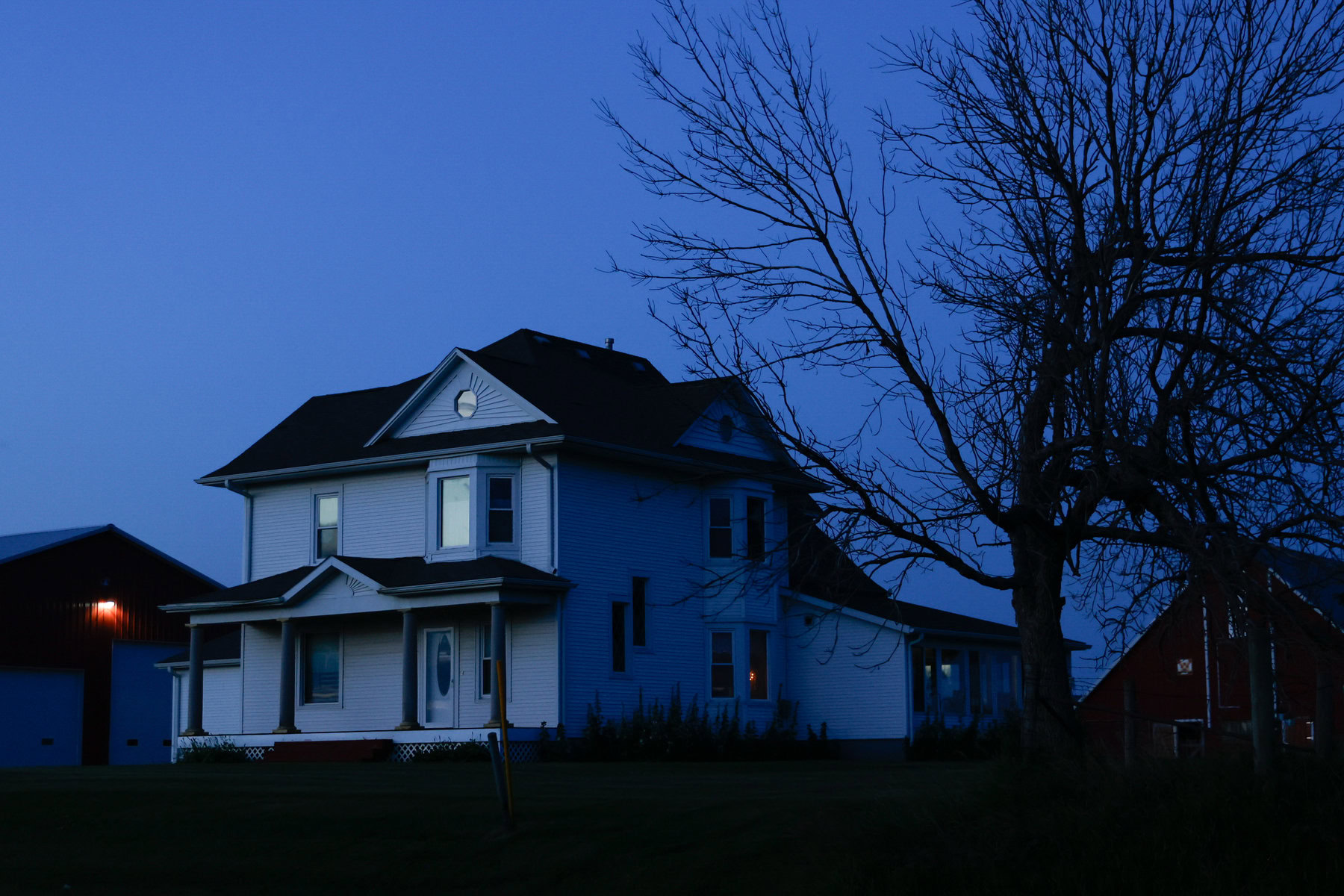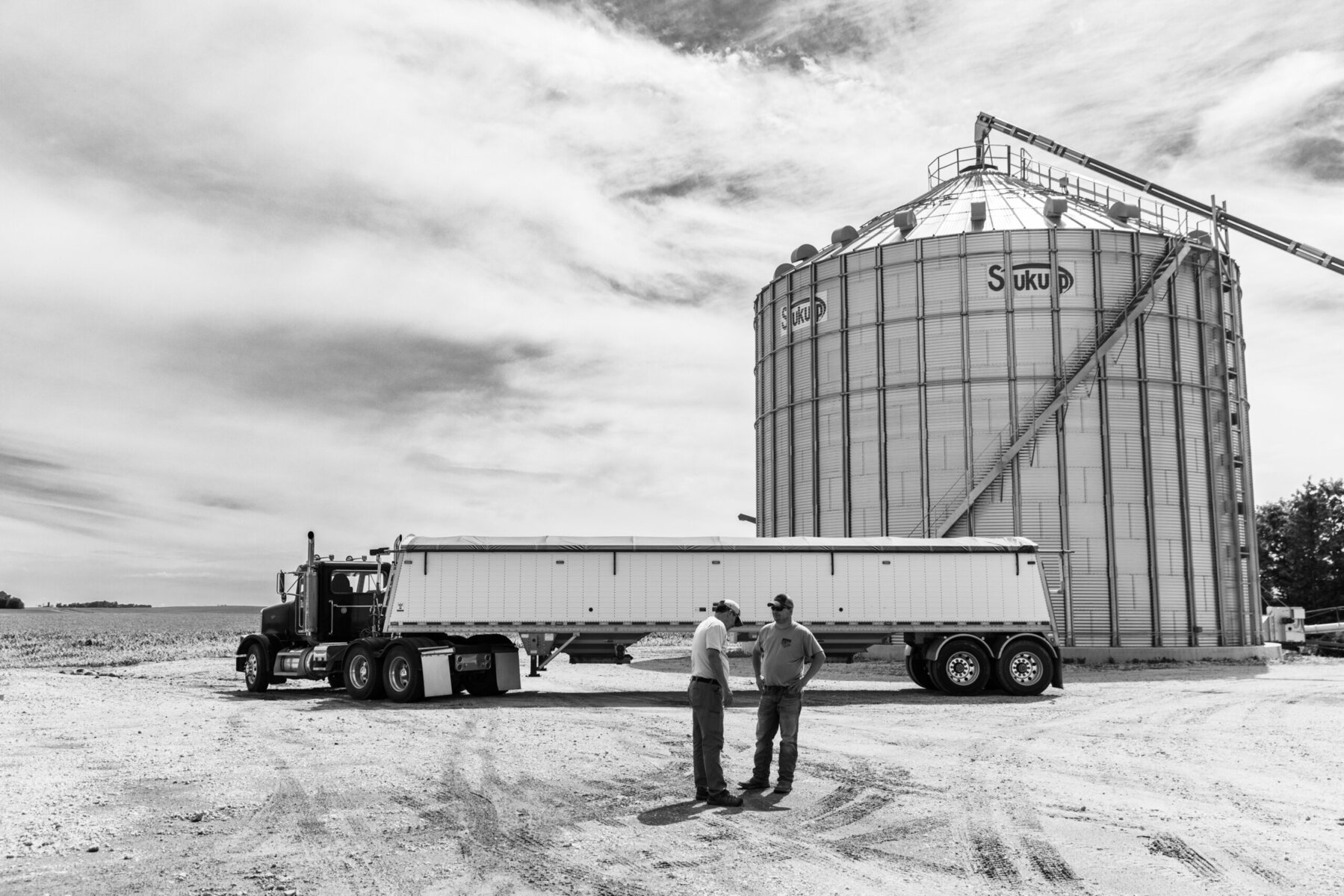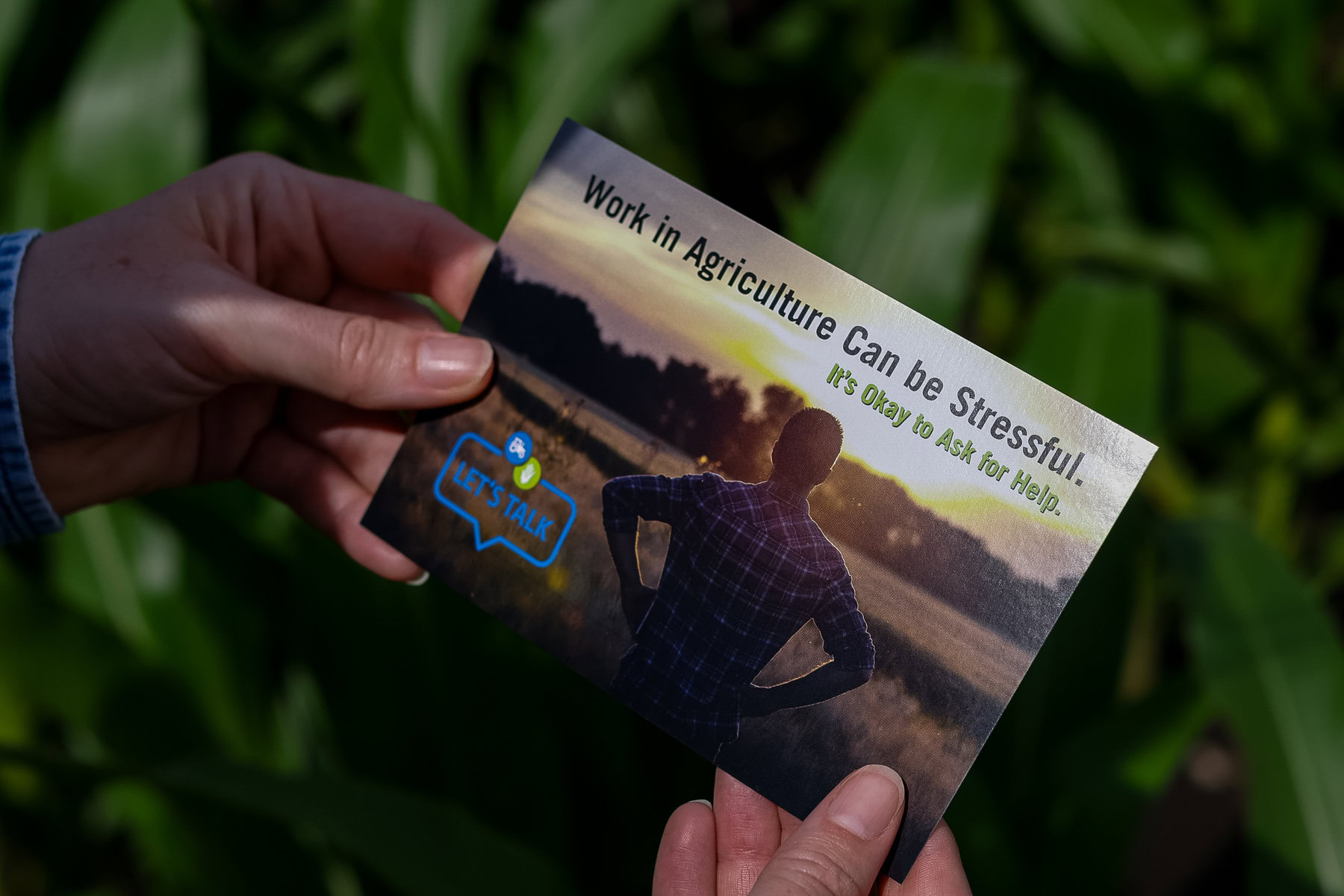For almost four decades, Dorothy and Don Harms tethered their lives to the needs of their dairy cows. Twice daily milking. Seasonal races to plant and harvest corn and alfalfa for feed. The fourth generation in his family to run the Reedsburg, Wisconsin, dairy farm, Don Harms knew each of their 130 cows by name. For many people who work in agriculture, Dorothy Harms says, farming is part of their identity. “It’s not their job,” she says. “It’s who they are.”
But the grueling schedule took a toll, so they gradually transitioned, launching a farm-stay tourism business, switching to beef cattle, and selling off their dairy herd little by little until they parted with the last 25 cows five years ago. In the weeks that followed, the couple grieved. Dorothy Harms’ body, so used to hard but rewarding work, yearned to go to the barn. Her husband struggled with anxiety and self-medicated with alcohol. “It was not an easy year,” she says.
Around the same time, another farmer in their community, a close friend of the Harmses, took his own life. As the community rallied around his family, another farmer shared candidly how he had struggled with suicidal thoughts. At one of those community gatherings, Dorothy Harms learned about an opportunity to try counseling with a voucher from the Wisconsin agriculture department, and the couple found the experience somewhat helpful for processing their emotions. In the agricultural town of Reedsburg, the subject of mental health, so often kept private, was suddenly in the spotlight.
The conversations led people in this area of south-central Wisconsin to start the Farmer Angel Network, an organization that connects farm industry professionals and their families with mental health resources. The group builds a sense of community through events like drive-in movie nights and trains health providers to better understand agriculture’s unique pressures. Dorothy Harms, co-founder and board president, says the network is a resource that people know they can turn to if they need help. “There’s so much isolation, oftentimes, in farming,” she says. “By having an opportunity for fellowship and people getting to share what’s going on, it just opens the doors for possible further discussion, deeper discussion.”
Farmers’ livelihoods are shaped by many factors beyond their control, from fluctuations in global markets to extreme weather that can derail an entire growing season. These stressors are contributing to a mental health crisis in agriculture. The suicide rate among male farmers and ranchers in the US is about 60 percent higher than that of all working-age men, and farmers have higher rates of depression, anxiety and suicide risk than the general population.
Amid this crisis, efforts are growing to break down stigma and improve access to mental health supports. Crisis hotlines and teletherapy are working alongside grassroots initiatives, like the Farmer Angel Network, to open conversations about mental health among farmers and neighbors.
“What we’re trying to do is acknowledge that there’s a spectrum of need and comfort,” says Josie Rudolphi, an assistant professor and extension specialist with the University of Illinois who has researched farm stress. “We’re trying to provide a menu of resources along that spectrum.”
For many farmers, business is personal. On family-run farms, there’s often no clear separation between work and home life, according to Remington Rice, who leads Michigan State University Extension’s Managing Farm Stress project. He grew up on his family’s cattle farm, where his dad can still see the cows from his bedroom window. “Agriculture can be more a way of life than a nine-to-five job,” he says.
This makes the unique stresses of farming difficult to compartmentalize, Rice says. Those uncertainties are significant: Anything from a late-season frost to a shift in global commodity markets can affect the farm’s financial security.
A 2018 survey of young farmers and ranchers in the Midwest found that more than half of respondents met criteria for depression, and 71 percent showed signs of generalized anxiety disorder. The US is not alone. In India, where climate change-driven weather extremes are diminishing harvests, about 30 farmers and farmworkers took their own lives every day in 2022.
But many farmers avoid talking about their struggles, a discomfort Rice attributes to a pull-yourself-up-by-your-bootstraps mentality. “I never heard my grandpa say that he was stressed or that he was sad,” Rice says. “Even though it was apparent to all of us that he was struggling at times, he never vocalized that.”
Crushed by negative news?
Sign up for the Reasons to be Cheerful newsletter.
That may be changing. As awareness of rural mental health issues grows, so does the number of initiatives to confront them, including funding through the 2018 federal farm bill to build out a network to support farmers through regional centers. Rice is optimistic this mosaic of efforts is making a difference. In a 2021 Farm Bureau poll, a majority of rural adults said there was still stigma around mental health in the agriculture community, but 92 percent of farmers and farmworkers felt comfortable talking with a friend or family member about mental health, an increase of 22 percent over 2019.
When farmers delivered corn and soybean harvests to local cooperatives in Dickinson County, Iowa, in 2022, many left with something unexpected: a goody bag. Each bag contained a cookie, a granola bar, a bottle of water, and a small card that read: “Work in Agriculture Can be Stressful. It’s Okay to Ask for Help.” On the other side was a QR code to access a list of local mental health resources.
That fall, 760 of the goody bags were distributed by the Rotary Club of Iowa Great Lakes (Spirit Lake), which was part of a coalition including local health providers, school officials, and county resource officials aiming to connect residents with mental health supports.

Farmers seemed like an obvious place to start, says Kathy Fahy, a longtime Rotary member who helped lead the effort. Fahy grew up on her family’s farm, about an hour’s drive from Spirit Lake, during the 1980s agriculture crisis when high debt rates and low crop prices forced hundreds of thousands of farms to shut down. She now runs the 800-acre soy and corn operation with her brother. Each season requires big investments of time and money to get started. This spring, the wet weather kept them waiting to get their crops in the ground. “The stresses of farming are real,” she says.
One day in 2005, Fahy’s mother — whom Fahy calls a “strong farm woman” — went missing. The next day, as community members gathered to help search the farm, Fahy’s mother tried to climb out of the loft door high up on the huge barn.
Fahy dashed into the barn and scrambled up hay bales to pull her mother back from the edge. When Fahy asked what she was doing, she responded she wanted to be with her mother, who had died months earlier. Fahy had no idea what a hard time her mother was having.
There is a culture of keeping quiet about emotional struggles among many farm families, Fahy says. “We had to get through to her that it’s OK to talk.”
Fahy’s mother got mental health treatment, which helped her process her grief and led the entire family to adopt a more open approach to emotional health. Those experiences helped inform the discreet approach the Iowa Great Lakes club took when reaching out to farmers. The club has since worked on other initiatives to connect people with mental health services, including events through schools. By starting conversations with young people, they hope the effects will ripple through families to reduce stigma. In the meantime, distributing goody bags from grain coops and farm machinery dealers offered a quiet way to get resources directly into the hands of farmers and farmworkers. “We didn’t want to scare people away,” says Fahy.
The QR code from the goody bags has been scanned about 200 times, connecting people with a website (letstalkdickinson.org) with information about symptoms of farm stress, links to resources like hotlines, and a guide to finding a mental health care provider.

Growing access to mental health services has emerged as a priority for rural areas. Some states offer programs that make services free for farmers. Even so, finding providers can be a challenge. As of 2019, 70 percent of nonmetropolitan US counties did not have a psychiatrist, and almost half did not have a psychologist.
Teletherapy is helping, according to Rice of MSU, which connects Michigan farmers to free online mental health services. The online sessions also help overcome stigma because they make meeting privately easy and don’t require taking time off to leave the farm.
Demand in Michigan has grown since the program started in 2020, when 20 people reached out. That climbed to 53 by 2022 and has held steady.
Another approach has been telephone hotlines, an effort funded by the US Department of Agriculture. In recent years, the Iowa Concern hotline has been expanded to serve 12 Midwestern states with around-the-clock support, as well as legal and financial resources, for farmers dealing with stress.
Relationships with family and neighbors are also important. Farm stress initiatives have focused on training community members in basic mental health awareness.
Norlan Hinke, a financial specialist at Iowa State University Extension and Outreach, has distributed thousands of mental health pamphlets throughout Iowa. A Rotary member since 2004, Hinke has spoken with Rotary clubs and incorporated the agriculture-focused campaign into the work of the district’s chapter of the Rotary Action Group on Mental Health Initiatives.
He has passed out information to people with jobs linked to agriculture, like veterinarians, bankers and machinery suppliers because they are well-positioned to hear when farmers are struggling. One equipment dealer Hinke spoke with was enthusiastic to share the pamphlets about farm stress with his staff. “His salespeople told him they were spending as much time just listening and counseling as they did selling merchandising equipment,” Hinke says.
A young farmer was getting ready to inherit the family farm. The person had been involved with farming and invested in farm equipment. But the parents, in their 70s, simply wouldn’t talk about a plan for the future.
The young farmer shared the stress caused by this precarious situation at an online “resiliency circle” event to help people in agriculture navigate farm transitions. Led by a counselor, 20 participants each month share their experiences and worries in writing and by speaking anonymously, without using video or identifying details. The sessions help people manage the practicalities of farm transitions and the complex accompanying emotions, like loss and grief.

While therapy appointments and crisis hotlines are important mental health options, says Monica McConkey, a Minnesota-based counselor who specializes in agriculture and leads the circles, these online support-group-like spaces can be more approachable. People listen in while driving a tractor or doing farm chores. “It’s a no-barrier option,” she says. “You don’t have to say anything. You don’t have to pay anything.”
These resiliency circles are run by the Cultivating Resiliency for Women in Agriculture project of the Upper Midwest Agricultural Safety and Health Center. The project launched virtual “coffee chats” in 2019 to give farmers an outlet to talk among peers about problems. The resiliency circles — focused on farm transitions and the particular pressures facing women in farming — started in 2022. These programs have grown to reach nearly 900 participants, most of them women, from almost every US state, five Canadian provinces and multiple other countries. “There’s just not enough support in rural areas,” says Doris Mold, a Wisconsin dairy farmer who co-leads the Cultivating Resiliency project. “So we’re just trying to offer additional services.”
Peer support can also be more comfortable for farmers than speaking with mental health providers, who don’t always understand the pressures and lifestyle of farmers. Mold has heard of counselors advising dairy farmers that they should take a few weeks off work, a near impossibility for a farm operator. Cultivating Resiliency programs fill the gaps. One woman told Mold the program had “saved her life.”
Efforts to support farmers are also looking beyond symptoms of stress to address root causes. Another organization that focuses on women in farming, Annie’s Project, offers courses that teach skills in managing farm finances and marketing. The program has proven particularly valuable for the networks it builds among women farmers, according to Karisha Devlin, who co-leads Annie’s Project with Mold.
Devlin, a longtime member of the Rotary Club of Knox County in Missouri, says those relationships help farmers navigate stressful situations. “Being able to make those connections and have that peer group is really powerful for women,” Devlin says.
MSU Extension also aims to address the deeper causes of stress, offering links to teletherapy alongside guides to farm budgeting and strategies to manage aspects of extreme weather, like harvesting frost-damaged soybeans. Rice often gives suicide prevention presentations at more general gatherings, like farm succession planning events or Farm Bureau meetings. Intertwining mental health and farm resources makes people more likely to engage.
For some farmers, addressing the root causes of stress can mean finding other ways of bringing in income. The expansion of renewable energy across the Midwest has offered some farmers opportunities to establish a steady cash flow by siting wind turbines on their land.
Around 2009, when the Michigan utility Consumers Energy was looking for wind turbine locations in Mason County, Ralph Lundberg signed up his family’s farm, which he had run since 1980.
“We’re not gamblers,” Lundberg says. “But this spring between the seed corn and the herbicide and the fertilizer, we’re going to put $150,000 in the ground and then sit back and wait and hope we get enough rain, enough sunshine for the crops to be raised.
“So in that sense, we are gamblers.”
But Lundberg also has five turbines on his land that generate an annual royalty of $10,000 to $25,000. The income just about covers the property tax bills.

Diversifying income is not always easy or cheap for farmers, says Rudolphi of the University of Illinois. But such opportunities for stable cash flow can reduce the pressures. “It’s providing some consistent income that a lot of farm families have never known,” she says.
The Harmses, in Wisconsin, have settled into life without their dairy cows. The beef cattle they raise now are less labor intensive, and they sell the meat directly from their farm, giving them more financial control than they had in the milk commodity market. Their oldest daughter and her husband are preparing to take over the farm.
And Farmer Angel Network’s influence has grown. Not only is the group reaching farm families across the county through events including ice cream socials and county farm breakfasts but it’s also inspiring mental health networks in other places. Another chapter launched recently in northwest Wisconsin. These grassroots networks build connections and a sense of belonging. “There’s room for everybody in this,” says Rudolphi, “and we need everybody in this.”
This story is a collaboration between Rotary magazine and Reasons to be Cheerful.
The post Seeds of Hope for Farmers’ Mental Health appeared first on Reasons to be Cheerful.




